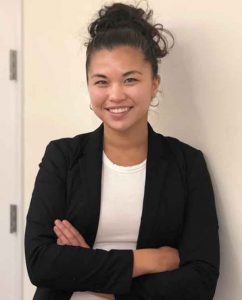A Syracuse University story by Sarah H. Griffin originally published on April 30, 2020

This experience inspired Nichols’ dedication to social justice and equity, and at Syracuse University she put this commitment into practice. While studying human development and family science in the Falk College, Nichols volunteered often with children and youth in the Syracuse community. One of the experiences that had an enduring impact in her life was her involvement with Juvenile Urban Multicultural Program (J.U.M.P Nation), a student-run organization that aims to raise college attendance in underserved communities. It achieves this goal by connecting eighth-graders and high school students to University students who provide encouragement, advice and insight to support their mentees’ paths toward higher education.
Beyond giving her opportunities to engage with the community and put her values into action, J.U.M.P Nation was meaningful to Nichols because of the bond she formed with other student mentors. “This is where I found my friends and my community,” she says. Nichols particularly values the friendships she made with other women. “I learned how valuable the unconditional support of a community of women can be,” she says. “It was very empowering.”
Resolve and Purpose Discovered Through Study in Africa
In her sophomore year, Nichols studied in Uganda through a Syracuse Abroad world partner program called the School for International Training (SIT). Nichols, whose parents are from the Netherlands and South Korea, was initially drawn to Uganda because she anticipated it would provide both the challenge and reward of real immersion in an unfamiliar culture. What she discovered instead was a sense of comfort and belonging. “People were so kind—it really felt like home right from the beginning,” she says.
Nichols lived in the capital, Kampala, and worked for Raising Up Hope Uganda (RUHU), an organization that serves homeless youth in an impoverished area of the city. While there, she saw a segment of the population who needed social services and resources but had very few options: women in their teens who lived and worked on the street. These young women—some of whom had children—rarely had familial support, and many were victims of abuse and violence. Seeing the acute needs of this population galvanized Nichols, and she vowed she’d find a way to work with and support these young women.
Making It Happen
After graduating in 2018, Nichols moved to New York City to work with Project Sunshine, an international nonprofit that supports hospital-bound children and their families. She also started raising money to develop programming and services for the population of homeless women she’d encountered in Kampala.
In fall 2019, Nichols was able to launch the nongovernmental organization Muwala Mulungi (which means beautiful girl in Luganda), and, working with her Ugandan colleagues from RUHU, secured a location for shelter and basic support services for young women in need.
Nichols’ vision for Muwala Mulungi is inspired by her Syracuse University experiences. “At its heart, Muwala Mulungi is about empowerment. That means helping the young women we serve achieve their individual goals. For some that might be job training, for others childcare, or maybe health services—but our goal will be to support each woman in what she chooses as her path forward,” she says. And she hopes, too, to foster the kind of caring community that was so instrumental to her Syracuse University experience. “When women support one another unconditionally—that is the most powerful kind of resource.”
Nichols was recently selected for the Alice Rowan Swanson Fellowship, a grant awarded by SIT Study Abroad allowing alumni of the program to return to the region where they’d studied and work on development projects there. She intended to use the grant to return to Kampala this spring. Although her travel has been postponed by the COVID-19 pandemic, Nichols is moving Muwala Mulungi’s mission forward in other ways. She continues to work with her Ugandan partners remotely and is applying for grants, taking courses in psychology, and researching options for further education in social work or public administration. She is grateful, too, for the professional experience she continues to gain in her role as coordinator of corporate programs at Project Sunshine—particularly for the insight into nonprofit management and team leadership, she says.
A guiding principle in Nichols’ work is the value of empathetic understanding, and she believes the pandemic will ultimately serve to forge cross-cultural connections. “Many injustices and many of the pressures marginalized communities deal with are essentially the same, regardless of country or culture,” she says. “Sometimes it takes an external environmental condition to reveal our common ground and bring us together.”
